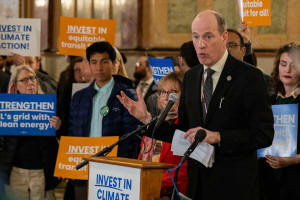Lawmakers give small boost to renewable developments, delay broader
reform
 Send a link to a friend
Send a link to a friend
 [January 10, 2025]
By Andrew Adams [January 10, 2025]
By Andrew Adams
SPRINGFIELD — Lawmakers this week passed a bill aimed at boosting the
development of renewable energy generation, but its proponents said the
final measure was a “skinny” version of what they had hoped to pass.
The bill comes as several state officials warn that Illinois is falling
behind on its clean energy goals. The state’s main funding mechanism for
renewable energy projects also faces a potential $3 billion budget
shortfall in the coming years.
The legislation gives state regulators more authority to balance the
budget for a key renewable energy financing tool, partially by shifting
financial risk to electric utility customers. It also sets up a study of
energy storage technology that is intended to form the basis of a new
bill later this year.
“We’ve seen the effects of climate change. We’ve seen the effects on
storms, extreme storms, extreme heat, extreme cold,” Rep. Robyn Gabel,
D-Evanston, said during floor debate. “This is something we must do. We
must move from fossil fuel, which emits carbon into the atmosphere, to
renewable energy. This bill has a few small changes that will help us
get renewable energy on the grid.”
The measure passed in the Senate 39-16 on Monday, with the House passing
it the next day 74-39. It will next head to the governor’s desk for
final approval before becoming law.

‘A very skinny bill’
The bill makes several changes to how the state funds renewable energy
developments. Sen. Bill Cunningham, D-Chicago, described these as
“highly technical.”
Existing law requires the state to purchase a certain amount of
electricity from renewable sources. The Illinois Power Agency purchases
this electricity using a system of financial instruments such as
“renewable energy credits.” These are tracked and budgeted using the
state’s renewable portfolio standard, or RPS.
But the IPA has struggled to find developers for some of these projects
– particularly wind farms. One of the driving concerns that developers
cite is whether the budget for the RPS, which is funded by a monthly
charge to utility customers, is sufficient to fund renewable energy
contracts approved by the agency.
This makes financing these large infrastructure projects difficult, as
banks and other institutions worry about the risk of not being paid back
if energy prices spike and the RPS budget falls short.
Over the past few years, the IPA has begun to raise alarms about the
funding mechanism. In October, the agency said the RPS could face a $3.1
billion budget shortfall by 2039, based on the agency’s long-term
renewable procurement plan.
The bill would guarantee that projects approved under the RPS will be
funded in case of unexpected spikes in prices by allowing utility
companies to charge consumers for the costs of any budget shortfall.
Gabel said during debate Tuesday that she doesn’t expect the policy to
lead to rate increases and that even if utilities needed to recover
money from customers, it would only be a temporary increase.
But Republicans were skeptical of transferring risk to ratepayers.
“All we’re doing here to add security to these failing projects is to
transfer, to put the burden on taxpayers, on ratepayers, one way or
another to make sure the creditors are going to get paid,” Rep. Brad
Halbrook, R-Shelbyville, said during debate Tuesday.

The bill also grants the agency more flexibility on the split between
its wind and solar procurement. While the agency has failed to meet wind
targets in the past, it often meets or exceeds its solar targets thanks
in part to the booming solar industry in the state.
These provisions were negotiated and largely agreed upon by the agency
and representatives of the renewable industry.
“We think this bill makes important and necessary changes, and we’re
looking forward to more robust discussions this spring,” IPA Director
Brian Granahan said in a statement Tuesday.
[to top of second column]
|

Sen. Bill Cunningham, D-Chicago, speaks at a Capitol rally organized
by environmental groups on Tuesday. (Capitol News Illinois photo by
Andrew Adams)

Revisiting the issue
The bill also requires the Illinois Commerce Commission to host a series
of workshops exploring battery-based energy storage. Renewable energy
advocates increasingly are looking to the nascent technology as a way to
make wind and solar power more reliable.
Because wind and solar power often do not generate electricity at times
of peak demand, storing electricity generated at off-peak hours could
keep electricity supplies affordable and reliable – at least according
to battery storage’s proponents.
Sen. Bill Cunningham, D-Chicago, has spent years advocating for more
incentives for battery storage. Gov. JB Pritzker, whose office was
involved in bill negotiations, in December said he supported the premise
of battery storage.
“The price of electricity is going up because of the higher demands, and
we have to have a strategy in place to deal with that,” Cunningham said
Monday.
A previous version of the bill would have set up a system of incentives
and a funding mechanism for battery storage projects, similar to how the
state handles renewable energy. That would have included allowing the
IPA to “procure” energy credits from battery storage facilities.
The ICC’s report on battery storage will be due to the General Assembly
by May 1. That report will then be used as the basis of a future bill
from Springfield, according to the bill’s sponsors.
“Nothing in this legislation empowers the IPA to do a procurement. We
would have to authorize that by state law,” Cunningham said. “The intent
is to come back in the spring and do that.”
‘Big year for climate legislation’
The bill passed Tuesday is also notable for what it didn’t include. In
addition to cutting out much of the battery storage policy, the final
bill didn’t include a set of provisions dealing with energy efficiency
programs.

That portion of the bill would have updated the state’s requirements for
solar energy rebates and provided subsidies for consumers who buy
efficient appliances.
Those provisions were cut after the governor’s office “raised some
concerns,” according to Cunningham.
Those portions of the bill were backed by the Illinois Clean Jobs
Coalition, an influential group of environmental organizations that
includes the Illinois Environmental Council.
“The bill that we’re going to see is not doing much,” IEC’s Executive
Director Jen Walling said Monday morning, after the bill was finalized
but before it passed.
The IEC, and the Clean Jobs Coalition more broadly, didn’t endorse the
bill, taking a neutral stance. Kady McFadden, a lobbyist speaking on
behalf of ICJC, said she was “disappointed” by the final bill, noting
the elements that were cut out or pared down.
Walling and others expressed a desire for broader legislation in the
spring.
“We’re setting up for a really big year for climate legislation,”
Walling said.
The IEC and ICJC brought hundreds of people to the Capitol Tuesday to
advocate for other climate- and energy-related bills, including bills
limiting the use of natural gas for heating buildings and reforming the
transit systems in the Chicago area.
Cunningham is also considering legislation that would boost incentives
for transmission line construction, a critical step as the state
increasingly relies on renewable generation.
Capitol News Illinois is
a nonprofit, nonpartisan news service that distributes state government
coverage to hundreds of news outlets statewide. It is funded primarily
by the Illinois Press Foundation and the Robert R. McCormick Foundation.
 |